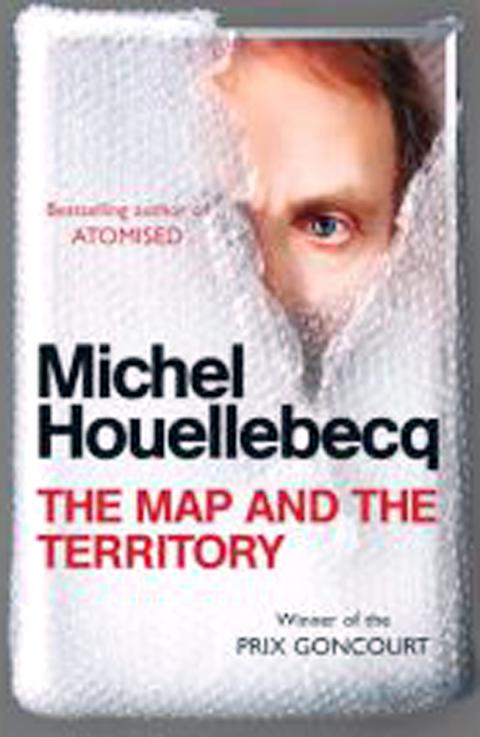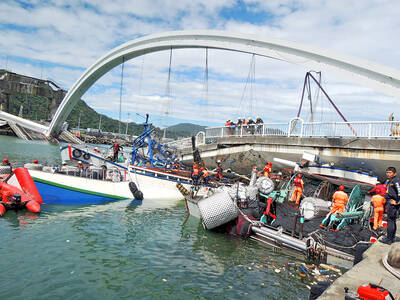Finally it’s arrived — the English-language translation of Michel Houellebecq’s latest novel that won the Prix Goncourt, France’s leading literary award, a year ago.
It tells the story of an artist, Jed Martin, in contemporary Paris. He begins his career photographing industrially produced objects — screws, table lamps — but then makes his name taking pictures of Michelin maps of France, enhancing them with images of the countryside they depict. An exhibition of these works is entitled “The Map Is More Interesting Than the Territory” — hence the novel’s title.
Next he proceeds to paint pictures of modern people at work. One is Bill Gates and Steve Jobs Discussing the Future of Information Technology, another Damien Hirst and Jeff Koons Dividing Up the Art Market. But he needs someone to write the text of his exhibition catalogue and hits on the idea of asking the famed writer Michel Houellebecq to do the job.

Houellebecq agrees and Martin flies to Ireland to show him photos of his pictures. While there he offers to paint Houellebecq’s portrait, which becomes Michel Houellebecq, Writer and is, by the end of the novel, valued at US$8.3 million.
It would be wrong to reveal what happens in between, but suffice it to say that the novel fast becomes a detective thriller, and the real Houellebecq thanks some senior members of the French police for helping him with information about their world.
Michel Houellebecq isn’t really a novelist by nature. He is, rather, someone drawn to observations about modern life, and life in general, who opts not to synthesize these perceptions, instead incorporating them into the texts of rather melodramatic novels. The Map and the Territory, for example, contains details of the kind of gruesome murders featured in blockbusters, complete with, at a later point, wolves howling at the full moon.
ARTIFICIAL ANUS
Nevertheless, his depiction of France today — now shorn of its traditional bar-tabacs, its incomparable landscapes given over to luxurious second homes, its cities characterized by the presence of unassimilated immigrants — is outstanding. His comments on dogs (“any kind of erotic refinement is unknown to them”), birds, fathers, air travel and the Parisian art world are almost worthy of his literary hero Alexis de Tocqueville. On old age he’s particularly ruthless; there is no sunset glow here, only decline, decay and unavoidable humiliation. Martin’s father, for example, is facing the prospect, following rectal cancer, of being fitted with an artificial anus — a detail very much par for the course for this author.
Houellebecq’s intellectual interests are clearly genuine. He’s fascinating, for example, on the 19th-century English artist and would-be social reformer William Morris. It’s an unexpected area of expertise for any Frenchman, but central to one of the book’s main concerns, the evolution of the Western world’s means of manufacture, from craftsman to industrial production line. He also writes knowledgeably on cars (“one of the last spaces of freedom”), expensive cameras and the Internet.
As for sex, there is far less of it in this novel than in its predecessors. It’s even possible that Houellebecq has changed his mind about the activity altogether. One of his characters, a senior policeman, describes it on what are classic Puritan lines — part of a brutal fight for domination and the elimination of the rival, the ultimate source of “all massacres and suffering,” and “the most direct and obvious manifestation of evil.” And as in all Houellebecq’s work, any opinion expressed by any character must be assumed to be the author’s own — he has just too much to say, you feel, for it all to be assigned to a single fictional creation.
Houellebecq is here once again proving himself adept at adopting an opposing view to the most widely touted one, which in this case sees sex as fundamentally liberating and as an instrument for bringing people together in a commercial and technological world. His trade is shocking the reader, not only the bourgeoisie — far too easy a task for his acerbic mind-set — but also, and particularly, people who naively think they’re at some sort of cutting edge of advanced opinion.
SELF-PROMOTION
As for the portrayal of himself as a character in the novel (something done by Paul Theroux in 2009’s A Dead Hand), it’s astonishingly arrogant. “There was in the author of Atomised something Jed had never noticed before”; “‘A genuine human drama,’ the author of Platform enthused”; “‘Just one bottle?’ asked the poet of The Pursuit of Happiness,” and so on. Houellebecq doesn’t need this kind of self-promotion, ironic though some of it undoubtedly is; nor do we need to be told he possesses an impressive library.
The Michel Houellebecq of the novel isn’t exactly the Michel Houellebecq of real life. Both lived for a time in Ireland, but the author himself now resides in Spain, not the French province of Loiret where the fictional character ends up. But there is on occasion an element of self-parody, as when Jed feels a desire to return to a revamped hypermarket, ie, somewhere that “gave him the stupefyingly strong desire to come back, as Houellebecq would have said.” (Phrases in italics are a hallmark of the author’s style, his version perhaps of scare quotes, though also echoing the custom of 18th century English printers.)
By and large, The Map and the Territory sees Houellebecq as bitterly nostalgic for a vanished France, and simultaneously eager to embrace the technological innovations that have come in the wake of its decline. It’s compulsive reading, and its ideas alone electrify the mind. They form the book’s essence, and collectively present a picture of post-industrial France, warts and all (though in fact mostly warts) that, as the Prix Goncourt judges clearly saw, would be hard to beat. But it isn’t Houellebecq’s best novel, and the thought that the prize was in fact awarded for his extraordinary fiction in general is difficult to resist.
Michel Houellebecq’s Atomized was reviewed in the Taipei Times on Sept. 15, 2002, Platform on Sept. 29, 2002, and The Possibility of an Island on July 30, 2006.

Before the recall election drowned out other news, CNN last month became the latest in a long line of media organs to report on abuses of migrant workers in Taiwan’s fishing fleet. After a brief flare of interest, the news media moved on. The migrant worker issues, however, did not. CNN’s stinging title, “Taiwan is held up as a bastion of liberal values. But migrant workers report abuse, injury and death in its fishing industry,” was widely quoted, including by the Fisheries Agency in its response. It obviously hurt. The Fisheries Agency was not slow to convey a classic government

Not long into Mistress Dispeller, a quietly jaw-dropping new documentary from director Elizabeth Lo, the film’s eponymous character lays out her thesis for ridding marriages of troublesome extra lovers. “When someone becomes a mistress,” she says, “it’s because they feel they don’t deserve complete love. She’s the one who needs our help the most.” Wang Zhenxi, a mistress dispeller based in north-central China’s Henan province, is one of a growing number of self-styled professionals who earn a living by intervening in people’s marriages — to “dispel” them of intruders. “I was looking for a love story set in China,” says Lo,

It was on his honeymoon in Kuala Lumpur, looking out of his hotel window at the silvery points of the world’s tallest twin skyscrapers, that Frank decided it was time to become taller. He had recently confessed to his new wife how much his height had bothered him since he was a teenager. As a man dedicated to self-improvement, Frank wanted to take action. He picked up the phone, called a clinic in Turkey that specializes in leg lengthening surgery — and made a booking. “I had a lot of second thoughts — at the end of the day, someone’s going

In the next few months tough decisions will need to be made by the Taiwan People’s Party (TPP) and their pan-blue allies in the Chinese Nationalist Party (KMT). It will reveal just how real their alliance is with actual power at stake. Party founder Ko Wen-je (柯文哲) faced these tough questions, which we explored in part one of this series, “Ko Wen-je, the KMT’s prickly ally,” (Aug. 16, page 12). Ko was open to cooperation, but on his terms. He openly fretted about being “swallowed up” by the KMT, and was keenly aware of the experience of the People’s First Party